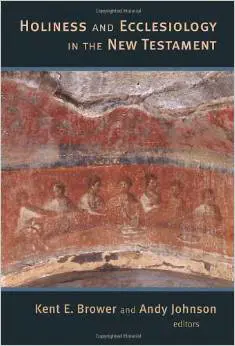

Holiness and Ecclesiology in the New Testament
Pages
385
Publisher
Eerdmans
Published
10/15/2007
ISBN-13
9780802845603
Throughout the biblical story, the people of God are expected to embody God's holy character publicly. Therefore, holiness is a theological and ecclesial issue prior to being a matter of individual piety. "Holiness and Ecclesiology in the New Testament" offers serious engagement with a variety of New Testament and Qumran documents in order to stimulate churches to imagine anew what it might mean to be a publicly identifiable people who embody God's very character in their particular social setting.
Inner Books
This physical volume has several internal sections, each of which has been reviewed independently
- Holiness in the book of Acts by I. Howard Marshall
- Introduction: Holiness and the ekkle¯sia of God by Kent E. Brower and Andy Johnson
- The Dead Sea Scrolls and New Testament ecclesiology by George J. Brooke
- Holiness in the Dead Sea Scrolls : the priorities of faith by Dwight Swanson
- Holiness and ecclesiology : the church in Matthew by Donald A. Hagner
- The Holy One of God and his disciples : holiness and ecclesiology in Mark by Kent E. Brower
- Gathered at the table : holiness and ecclesiology in the Gospel of Luke by Richard P. Thompson
- The holiness of Jesus and his disciples in the Gospel of John by Richard J. Bauckham
- Reading Paul with Acts : the canonical shaping of a holy church by Robert W. Wall
- "You shall be cruciform for I am cruciform" : Paul's trinitarian reconstruction of holiness by Michael J. Gorman
- Made holy by the Holy Spirit : holiness and ecclesiology in Romans by Peter Oakes
- Carnal conduct and sanctification in 1 Corinthians : simul sanctus et peccator? by Bruce W. Winter
- The people of God in a pluralistic society : holiness in 2 Corinthians by J. Ayodeji Adewuya
- Circumcision in Galatia and the holiness of God's ecclesiae by Troy W. Martin
- Church and holiness in Ephesians by George Lyons
- Working out salvation : holiness and community in Philippians by J. Ross Wagner
- The sanctification of the imagination in 1 Thessalonians by Andy Johnson
- The perfection of Christ and the perfecting of believers in Hebrews by Gordon J. Thomas
- Living as exiles : the church in the diaspora in 1 Peter by Joel B. Green
- Holiness and ecclesiology in Jude and 2 Peter by Ruth Anne Reese
- "On earth as it is in heaven" : holiness and the people of God in Revelation by Dean Flemming
Reviews
This book explores how the “concepts of holiness and the people of God are related as they come to expression in a variety of biblical documents” (xvii). It is dedicated to Alex R. G. Deasley, Professor Emeritus of New Testament at Nazarene Theological Seminary, and is a collection of essays written by friends, former students, and colleagues. In an excellent introduction, the editors identify five themes that emerge when the essays are viewed as a whole. Overarching all five themes is the locus of the project: the volume intentionally approaches the study of holiness with the stated assumption that holiness is a theological and community issue prior to being an individual concern. The editors identify a “clear limitation” in that, while the Old Testament grounds the discussion of holiness, there are no essays devoted directly to the study of holiness in the Old Testament. A second limitation is the diversity in viewpoint. There is general agreement that, prior to the eschaton, God calls a holy people to Spirit-enabled reflection of his character to some extent, while there is disagreement over just how much transformation a community, and the individuals making up the community, will experience. The first theme that captures the message of the book is that holiness is an orienting concern for Second Temple Judaism and early Christianity.
[Full Review]
